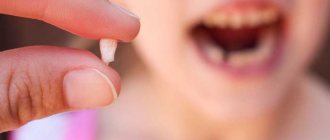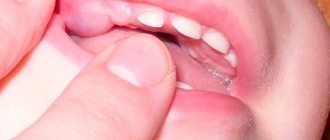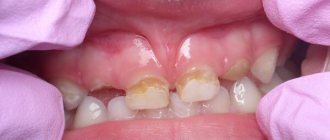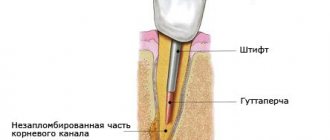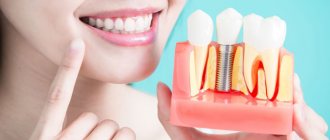The appearance of the first teeth is an important event in the life of the baby and new parents. As a rule, starting from 5-6 months of a baby’s life, mothers and fathers begin to expect signs of tooth growth. However, it often happens that time passes and an important event never happens.
What should parents do if their child has no teeth at 8 months? Should I start sounding the alarm and run for help to a specialist at a medical facility to conduct research? Is missing teeth at 8 months a serious pathology? Or is this just a feature of the child’s body? It is very important for every parent to find answers to the questions posed in order to be sure that the baby’s development is happening correctly.
Should I worry if my 8 month old baby has no teeth?
Very often there are situations when teeth do not appear by the specified time. The child is 8 months old and has no teeth. What should a young mother and father do in this case? Parents should not start sounding the alarm if their baby is missing teeth at 8 months and has any signs of teeth appearing. It is strictly forbidden to give medications or dietary supplements to an infant without a prescription from a pediatrician.
If new mothers and fathers are worried about their baby’s missing teeth, it is best to contact a specialist at a medical facility to receive qualified help and undergo an examination and examination.
Parents should talk to other relatives to find out at what age their first teeth began to appear. It is possible that the late appearance of hard formations in the oral cavity is due to genetic characteristics.
In addition, mothers and fathers need to periodically examine the baby's mouth to detect signs of teething. As a rule, the process occurs in several stages. A baby's gums may swell periodically. If such a phenomenon is observed, the parents of the baby should calm down.
Should parents sound the alarm?
Typically, the first teeth begin to erupt when babies are six months old. By 10 months of their life, the oral cavity already has several pairs of the first masticatory organs.
Parents tend to worry when the appearance of teeth is delayed for unknown reasons:
- The type of feeding plays a significant role: infants depend on the quality of breast milk, so the diet of a nursing mother is important. Children who eat artificial formulas receive a little more useful microelements, since the mixtures contain a clearly prescribed amount of vitamins and minerals,
- the absence of even one tooth at 6 months can be a consequence of a previous illness: malfunction of the intestines and lack of vitamins C, D,
- masticatory organs may be late due to the special course of pregnancy, the mother probably had complications during pregnancy,
- the appearance of a tooth after 12 months may indicate its incorrect placement in the gum,
- a more serious cause may be the congenital absence of tooth germs. The pathology is extremely rare.
How can parents determine that at 10 months the teeth are simply too late, and they need to wait it out, and when to sound the alarm? Pediatric dentists suggest the possibility of delaying the appearance of teeth for up to six months.
For this reason, if not a single baby tooth has erupted since birth, you need to wait a little more time. Try to find out from relatives about the timing and features of the eruption of the first chewing organs in their infancy and childhood. It's probably just a family trait.
Why does an 8 month old baby have no teeth? Causes
There are many reasons why a baby may experience delayed teething. It is worth listing the most common ones.
1. Rickets. The occurrence of this disease can provoke a significant delay in teething. If the baby has been diagnosed with rickets, the baby’s parents need to go to a medical institution to conduct the necessary examination, as well as to donate blood to check for the presence of vitamin D in the baby’s body.
2. The presence of disorders in the endocrine system of the body.
3. The absence of teeth, caused by illnesses suffered by the mother during the period of bearing a child, can cause an eight-month-old child to have no teeth and severe disturbances in the order of their appearance.
The formation of the dental apparatus is also influenced by the diet followed by the expectant mother and lifestyle. The course of pregnancy is one of the factors that pediatricians consider when determining the cause of the delay in the appearance of the first teeth.
The delay in the appearance of hard formations in the infant’s oral cavity may be due to genetic characteristics. If close relatives: parents, sisters, brothers, grandparents, first teeth appeared quite late, then the phenomenon of delay is quite understandable.
What Doctor Komarovsky says
Experienced doctor Komarovsky in his lessons gives answers to the problems that will arise for parents if the baby’s teeth do not appear. You can find many videos with his lessons on the Internet.
The main reasons for missing teeth on time are a lack of calcium and vitamin D. Much depends on the individual characteristics of the child and his body. Without examining the baby, it is impossible to say with certainty why he has a pathology.
In case of such a problem, it is important to visit a pediatrician, who will examine, find out the cause of the disorders, and refer you for consultations with doctors, if necessary.
How many teeth should an eight month old baby have?
Correct, i.e. normal, development of the baby’s chewing apparatus implies that the baby has the rudiments of 20 milk teeth and 16 molars. By the eighth month of a baby’s life, there may be from two to four teeth in the baby’s mouth. In some cases, the number of solid formations can reach six or even eight.
Teeth eruption is characterized by their paired appearance on the left and right sides of the jaw. Solid formations begin to appear in a certain sequence. However, here, too, some deviations from the norm are possible, due to the characteristic features of the child’s body or genetic characteristics.
Reasons for missing teeth
If a child is 7 months old and has no teeth, why this happens depends on several factors. First of all, you need to pay attention to heredity. If the parents' first teeth came out late, then the child's teeth will probably also be delayed.
Teething gum gel for babies
Other reasons:
- If the child lives in cold climates, teeth may begin to erupt later;
- Girls are more likely to get their teeth out earlier than boys;
- When there is a lack of calcium in a pregnant woman's diet, teeth formation may be delayed;
- Lack of vitamin D, which affects bone formation;
- Hormonal disorders;
- Gluten intolerance.
What deviations from the norm are acceptable?
If you take 6 months as the average age for teeth to appear, then you can safely wait another six months for this event.
Important! If by the age of one year the baby’s teeth have not yet come out, then it is better to contact a pediatric dentist.
Violations in the sequence of teeth coming out are also considered normal. If two incisors emerge from below, and then one tooth from above, then the second upper incisor may emerge after the appearance of the lower lateral incisors. That is, there will already be four teeth on the bottom, and the second one will just begin to emerge from the top.
The general rule is that the bottom teeth appear slightly earlier than the top teeth. But why panic if the top teeth come through first? This is also a variant of the norm.
Deviations in the order of eruption
Important! Late teething has its benefits. If they appear later, it means that the enamel will be better mineralized, since the main mineralization occurs when the tooth is still inside the gum.
Pathological causes
Pathologies in the formation of fetal teeth are very rare (in less than 1% of infants), but they do exist. This happens when the rudiments of teeth dissolve or do not even form in the child’s body. There are several types of pathologies:
- Hypodontia is the absence of up to six teeth. It can be congenital and subsequently developed;
- Anodontia – complete absence of teeth;
- Oligodontia is the absence of more than 6 teeth. It has an innate character.
Among the factors determining pathology, the main one is genetic. Other reasons:
- injury or infection during tooth development;
- gland dysfunction;
- rickets;
- measles during pregnancy;
- serious intrauterine disorders.
Signs of the appearance of the first teeth
The process of the baby’s first teeth appearing in most cases has a number of distinctive features and is accompanied by many symptoms.
1. An increase in temperature can be observed from 1 to 3 days. In some babies, this phenomenon accompanies the teething process for up to five days. The thermometer can reach 39 degrees. To reduce body temperature, pediatricians prescribe various antipyretics to the baby.
2. Malaise and weakness can also accompany an important process. As a rule, this phenomenon is caused by an increase in temperature, as well as discomfort in the gum area.
3. Poor appetite is explained by the presence of painful sensations in the gums. During teething, doctors recommend giving your baby as much liquid and food of a similar consistency as possible.
4. Sleep disturbance.
5. Increased salivation.
6. Cough, runny nose. Cough is a consequence of increased salivation.
7. A constant desire to chew on various objects and suck a finger. During the period of teething, a small child practically does not remove his hands from the oral cavity.
It is very easy to confuse the above symptoms with signs of an incipient viral disease or cold. That is why it is very important to immediately consult a doctor if one of the symptoms is detected (especially if the temperature rises). The pediatrician will determine the true cause of the illness and prescribe treatment. Self-medication is strictly prohibited. This may harm the baby's health.
When do the first teeth appear?
It is widely believed that a baby's first teeth should appear at six months. If a child is 7 months old and has no teeth, parents begin to worry.
Baby teeth begin to form in utero long before they become visible. Their rudiments appear already in the sixth week after fertilization. Over the next months, gradually, layer by layer, they are covered with hard enamel. A newborn's baby teeth are already formed.
A little later, roots begin to form. As they grow, they slowly push out the top of the tooth, which breaks through the gum. It happens that everything happens so quickly that the child is born with one or two teeth.
Newborn with teeth
Timing of the eruption process
There are average periods for the appearance of teeth, which are the norm.
Important! Each child is individual. It will be normal for a 4-month-old baby to erupt the first teeth and for a 10-month-old baby too.
Average terms:
- At birth, teeth are not visible. They are partially formed, but are located inside the gum;
- The first teeth appear on average between the fourth and seventh months (most often around 6 months of age). First, 4 central incisors emerge, two each below and above;
- At approximately seven or eight months, the 4 lateral incisors emerge;
- When a child is about a year old, his first 4 molars begin to grow. This leaves free space between them and the lateral incisors;
- This space contains 4 canines, which usually emerge at approximately 1 year and 4 months;
- At about 2 years of age, the second molars begin to grow;
- At the age of 3 years, a child should have all 20 baby teeth.
Teething pattern
Important! In children with late teething, they can all come out almost simultaneously.
Number of teeth in a 7 month old baby
Experts advise determining the average number of teeth a baby has, corresponding to the age norm, by subtracting the number 4 from his age. For a 7-month-old child, the norm will be either 1-4 teeth or their complete absence.
How to help your baby
If a child has no teeth at 8 months, Komarovsky, a children's doctor whose opinion is listened to by millions of mothers and fathers, recommends not to fall into despair. In his opinion, the task of parents is to help their baby survive the difficult period of teething. It is important for new mothers and fathers to give their baby as much fluid as possible. The most suitable drinks would be fruit drinks and compote, which will not only perfectly quench the child’s thirst, but will also help strengthen the body’s defenses. After all, during teething, the immune system is very vulnerable.
To distract the baby, parents need to play fun, but not too tiring games with him, and also spend more time outdoors. To reduce itching, you can give your baby solid vegetables or fruits or use a special teether, which can be purchased at any pharmacy and baby goods stores.
Schedule glitches: reasons
When a baby has no teeth at 8 months, this cannot be attributed to pathology. The period of appearance of teeth in a child is associated with the characteristics of the body. It happens that a baby may be born with teeth.
Circumstances for which there are no teeth at 8 months:
- Genetic factor.
- Lack of calcium and vitamin D.
- Metabolic disorders in the mother and inflammation in the body during pregnancy.
- Drinking alcohol, smoking during pregnancy.
Prevention of teething disorders in infants
Doctors recommend that women prepare in advance for the desired pregnancy. The expectant mother needs to closely monitor the health of her teeth and the condition of her oral cavity in general. It is useful to take vitamin complexes, as well as eat foods rich in calcium as often as possible.
It is recommended to get rid of bad habits and carefully monitor your health. It would be useful to regularly check the level of hemoglobin in the blood.
After the birth of the long-awaited baby, you need to monitor his proper nutrition, often walk in the fresh air, carry out hardening procedures and regular hygiene.
